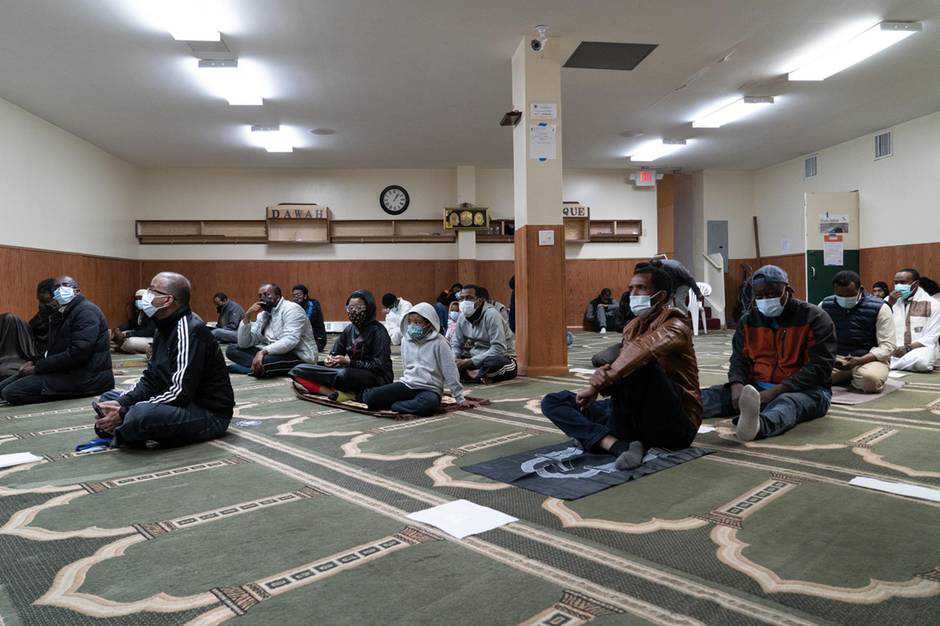Prayers and protest: Minneapolis Muslims celebrate Ramadan amid heightened racial tension
02 May, 2021

Deonte Bryant stands at a tiny pulpit in a candlight basement mosque in south Minneapolis and reads from an ornate Quran.
In slightly American-accented Arabic, he recites a text from the book that explains what goes on when a “believer” kills another “believer” in error.
“Does it remind you of anything?” asked Mr Bryant, who also uses the name Abu Bakr. “Except what happened upstairs had not been by mistake.”
He was discussing last year’s killing of George Floyd, who died beneath the knee of a Minneapolis policeman just metres from the Na’matul Islam Mosque, which is located in the basement of the Cup Foods supermarket.
Floyd, 46, died of asphyxiation beyond your shop on May 25 as former officer Derek Chauvin knelt on his neck for a lot more than nine minutes.
On April 21, Chauvin was convicted of three charges in the killing, including second-degree murder.
For months after Floyd's death, protests raged around the globe, with demands racial justice and greater police accountability.
In the bottom of a dark stairwell leading into the Cup Foods basement, the local Muslim community comes to grieve and escape the pain and chaos of days gone by year.
“It’s pretty simple to shut the whole world [out] and just focus on praying and after you’re done, get back to work and real life,” said Mahmoud Abumayyeleh, who owns the building housing the mosque and Cup Foods.
Mr Bryant, who serves as the imam for Friday prayers, said many of the mosque’s 15 worshippers are of Somali descent.
“I think it afflicted us a whole lot,” he told The National.
For the city’s wider Muslim community, Chauvin’s guilty verdict came as a relief.
“Immediately, when the judge browse the verdicts, you could hear the persons screaming, celebrating, a big sigh of relief,” Mr Abumayyeleh said.
'When we weren’t protesting, we were all praying'
Some view the timing of Chauvin's conviction as especially meaningful. The jury’s decision came in the next week of Ramadan.
“How fitting could it be that it's in Ramadan that we’ve got a small amount of justice, since when we weren’t protesting, I think we were all praying and I think this verdict is obviously a prayer being answered,” said Ifrah Mansour, a Somali-American multimedia artist and teacher in Minneapolis.
The twin cities of Minneapolis-St Paul are home to roughly 40,000 Somali Americans, by far the greatest concentration in the US, and the community has been actively involved with protests supporting the Black Lives Matter movement.
“As a community of folks of colour, when you see persons as if you that are constantly being killed, it certainly breaks your heart because that is your community that's being hurt,” Ms Mansour told The National.
Over the US, police kill about three persons a day, and people of colour are disproportionately affected. Officers seldom face charges and convictions are rare.
In December, Somali-American Dolal Idd, 23, was shot and killed within an exchange of gunfire with Minneapolis police.
His death was the city's first police killing since Floyd’s murder, sparking a fresh round of protests.
“You can’t imagine just how many calls we’ve received from beyond your USA [asking] ‘Are you OK, are you safe? Are Muslims safe?’” Imam Hassan Ali Muhammad of the Da'wah Mosque in St Paul said.
“Especially Somalis, because Somalis are black Muslims,” he added.
A period of reflection
On April 11, as Muslims across Minneapolis prepared to enter the holy month, the town was rocked by another police killing.
Daunte Wright, a 20-year-old black man, was fatally shot by a police officer during a traffic stay in a nearby suburb, leaving yet more protests.
For Ruhel Islam, whose restaurant Ghandi Mahal was burnt down in last summer’s protests following Floyd’s death, it’s been a hard 11 months.
“It had been very traumatising when we had to see all these problems, the protests, the riots, the burning, persons not getting justice,” Mr Islam said.
The Bangladeshi American went viral this past year when his daughter wrote a Facebook post recounting how she’d heard her dad say over the telephone: “Let my building burn; justice should be served.”
The restaurant remains closed, but Mr Islam has opened a non permanent location nearby. He still feels the protests are more important than his restaurant.
“It appears like our voice has been heard,” he told The National. “We’ve got some justice coming. But we have more work to accomplish.”
Mr Islam, who grew up under a military dictatorship in Bangladesh, said he's determined to keep supporting protesters and the fight for racial justice.
On a recent cold evening just before breaking his fast, Mr Islam walked through his non permanent restaurant. He stopped near to the exit, where three large frames filled with letters of appreciation for his support of the protests hung.
Looking at the letters, he said: “George Floyd brought a lot of individuals together. His death exposed our moral responsibility. It woke us up.”
Source: www.thenationalnews.com
TAG(s):
